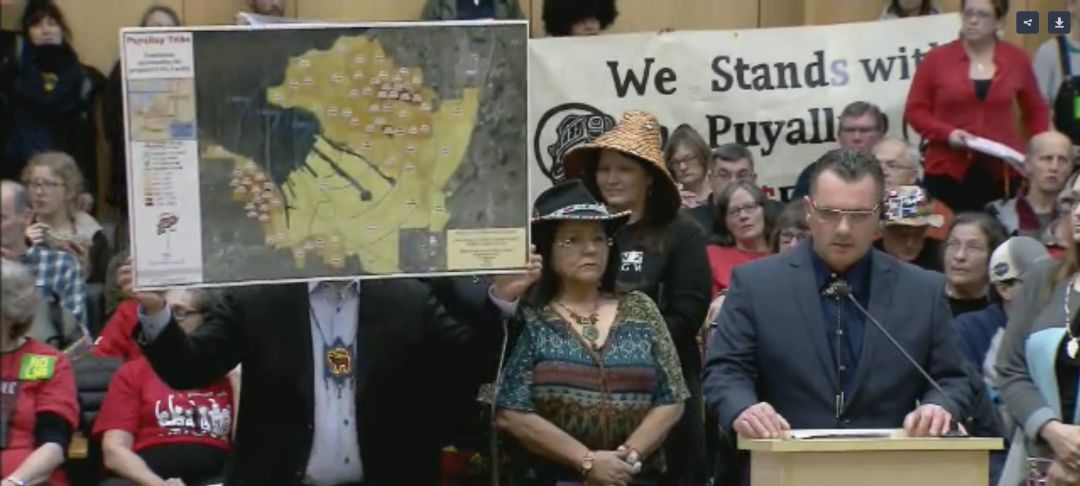Sawant's Resolution to Oppose Tacoma LNG Plant Heads to Juarez's Committee

Puyallup Tribal Council member James Rideout testifies at the council's public hearing on January 30, 2018, in support of Sawant's resolution with activists standing behind him.
Image: Seattle Channel
A Kshama Sawant resolution to oppose Tacoma's proposed liquefied natural gas plant failed to garner votes Monday afternoon and instead made its way to Debora Juarez's Native communities committee.
The resolution drew a crowd of activists to the council meeting Monday who spoke against any kind of fossil fuel infrastructure and stood with members of the Puyallup Tribe. The legislation as it stands would have urged the Puget Sound Clean Air Agency to reject Puget Sound Energy's application for a permit for the facility, asked that Mayor Jenny Durkan "seek every legal opportunity" to influence other board members for the PSCAA (she sits on the board), and encouraged Seattleites to testify against the plant in public comments.
For years, the tribe has been battling PSE and the city of Tacoma over the project; it sued the city of Tacoma, PSE, and Port of Tacoma in 2015 asking that the proposed facility's permits be yanked and alleged errors in the environmental impact statement.
But the council delayed the resolution for a number of reasons, namely that Debora Juarez—who grew up on the Puyallup reservation and was a tribal lawyer for years—said the council also didn't consult the Puyallup Tribal Council as a government entity in crafting the resolution.
Council members also said they didn't have enough time to properly discuss amendments before the vote that afternoon. The resolution as is pitted unions who supported the plant against the tribe by taking a hard line against the facility, and fossil fuels, as opposed to focusing on PSE's lack of consultation with the tribe. Right now, the resolution doesn't even mention tribal rights, simply tribes' opposition and wanting to "stand in solidarity" with them in a "struggle against climate change."
Juarez said in the council meeting that she wants to work with the tribe "government to government" and involve elected members of the tribal council rather than rush legislation out of the council.
"I mean no disrespect to the advocates, activists, environmentalists, and all the groups that align themselves with Native people. But again, tribes are not an interest group," Juarez said in council chambers as the room got quiet. "We're not a club, we're not a political base, we're not a grassroots organization. We are a government. ... Our people died for this land."
Members of the Puyallup Tribal Council on Monday spoke against the 8-million-gallon LNG plant, which would involve some fracking and produce 250,000 gallons of LNG a day.
"Had they come to us five, six years ago when they first began planning this project, we could very well be having a different conversation right now," Puyallup Tribal Council member David Bean said. "This situation that we're facing, this lack of respect for tribal sovereignty, this lack of respect for our tribal ancestral homeland, is not exclusive to the Puyallup Tribe."
But labor representatives opposed the resolution and argued that the liquified natural gas was the environmentally friendly alternative that helped to reduce greenhouse gas emissions. Dale Bright, president of the Martin Luther King County Labor Council, urged council members to table the issue and focus on local problems Seattle is facing.
"This resolution carries no weight and divides us over what is considered to be one of the transitional fuels as we move away from carbon-based energy," Bright said.
The resolution on Monday morning also drew tension among council members who complained that they haven't seen the four proposed amendments that are supposed to be incorporated into the resolution. Sawant told council members during the briefing that she's willing to accept the amendments, but hasn't incorporated them into the base legislation. That resolution, she said, has been available to council members for two weeks.
Juarez proposed amendments, based off other council members' feedback, that tinkered with the language. But council members said Sawant didn't circulate those amendments for all of them to see before the vote that afternoon.
"I'm not an idiot. I've read the base ordinance," Gonzalez responded to Sawant. She said she's only heard about the amendments but hasn't seen them or been given the proper time to consider them. "That is unfair to the process, it's unfair to each other, and I don't think that it's the most transparent way for us to do business on a really important policy issue that a lot of us have strong opinions about."
Ultimately council members said they supported the resolution's message, that climate change disproportionately affects tribal members and that PSE should have consulted the tribe before it began making plans. (That includes labor leader Teresa Mosqueda, who said unions supported tribal sovereignty, and that "we will not reduce this issue to labor versus tribes.") Juarez fought back against opponents who said in public testimony that the issue wasn't relevant to the council.
"I bristle when I hear people say, 'Stay in your lane,'" Juarez said. "This is our lane, it's Indian country."




